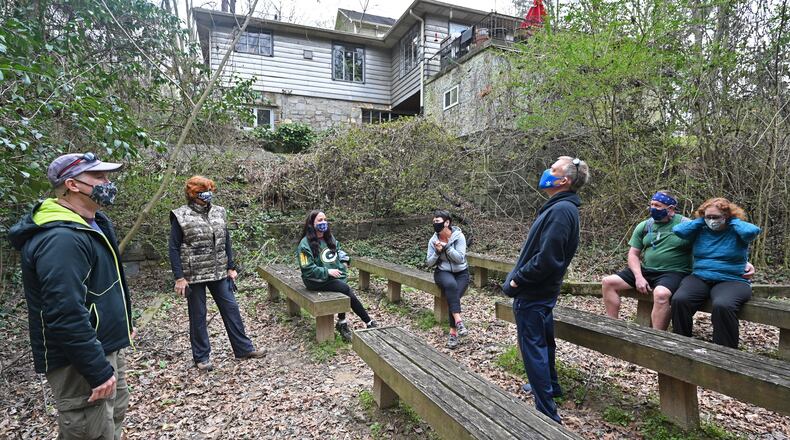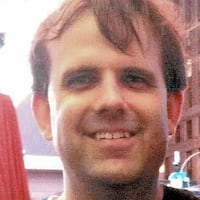Steve Novotny was looking forward to training a new Habitat for Humanity volunteer at an Atlanta homebuilding project a year ago when the arrival of COVID-19 began shutting down face-to-face interactions.
Volunteering together is an important social activity for Novotny and his circle of friends. They began texting each other their disappointments.
“Everyone was talking about flattening the curve then, and we thought it would last a few weeks or a few months and then we’d be back building houses,” he said.
Instead, Georgia went into a government mandated lock-down, leaving one friend who often brought homemade cookies to Habitat sites “so depressed,” Novotny said.
“When we couldn’t volunteer, it took a physical, emotional and mental toll. We couldn’t see the same people we were used to seeing,” he said.
The pandemic quickly drew a curtain between Georgians and extended family, co-workers, neighbors and friends. Everything from Easter egg hunts to massive sporting events came to a halt. Restaurants and bars closed. Couples getting married faced each other in masks. But the separation and loneliness also inspired creativity, if not to bridge the gap, to at least put us in waving distance of each other.
Adirondack chairs arranged in a spaced circle are common in neighborhood yards. Seniors with new grandchildren and guests at weddings are making do with Zoom calls instead of hugs and tossing rice.
Credit: HYOSUB SHIN / AJC
Credit: HYOSUB SHIN / AJC
Novotny pushed back the isolation by organizing weekly hikes at Metro Atlanta trails though a Facebook group he named “Screw You COVID.” It took some time for the group to adjust — distanced and mostly in face masks — but they embrace it now, he said.
“We’ve put on several hundred miles of hikes since starting the group. It’s been a major source of socialization for us,” he said.
Julie Vasquez of Decatur grieves the loss of connections and traditions that “seem all but gone for now.”
There was no yearly beach trip with her family of six brothers and sisters with spouses, partners, kids and grandkids in tow. No dining out, no socializing in bars. Vasquez has hosted a Christmas brunch and gift exchange at her Decatur home with about two dozen family members since her father died a decade ago. Not in 2020.
The gregarious Vasquez has been a forced introvert for 12 months, but recently figured out a way to revive her social life.
She now meets friends at an outdoor area behind Waller’s coffee shop in Decatur. It’s not a perfect arrangement. She no longer hugs them. Instead she tries to appreciate the slow pace of the pandemic as a soothing practice.
She realizes that type of social gathering is something she needs.
“That has been a lifesaver for me,” she said.
The pandemic may cause emotional damage for some even after it ends, said Allen Furr, a retired sociology professor at Auburn University. The SARS pandemic quarantines of 2003 negatively affected the mental health of healthcare workers and people in isolation.
“The effects of the pandemic could last a year or more, especially if they have lost a job or lost a loved one,” Furr said.
Gabriel Tannous, a priest at St. Elias Antiochian Orthodox Church in Druid Hills, sees more pronounced feelings of isolation at funerals because no close personal contact or communication is allowed.
“That’s going to cause some lingering issues about not having any closure,” he said.
Tannous’ job is intimately connected to his community and some of its most important celebrations and social moments. He was rarely stuck at home alone before the pandemic.
Parishioners still come to services in person, though he limits the number and everyone is spaced out. He banned the Rite of Mutual Forgiveness, an Orthodox ritual that involves an exchange of cheek-to-cheek kisses.
Tannous tells members he hopes the changes are temporary, and that he must endure them, too.
“Even six feet is too much distance for a lot of people,” he said.
He sees the effects on his personal life as well. His large family is spread across the country, but they traveled often to see parents, grandparents and siblings, especially for momentous occasions like weddings and baptisms.
“Even six feet is too much distance for a lot of people."
But he and his wife, Gabriella, canceled their yearly holiday visit to Houston to visit his parents. Gabriel’s sister and her family weren’t able to attend his son’s baptism in August. Gabriel hasn’t met Georgina’s newborn daughter. His sister also was unable to attend their brother’s wedding.
For spread-out families, the only way to connect has been through video calls. That’s something Tannous said they never would have done before the pandemic.
“All of my family absolutely would have seen these newborns and attended these weddings,” he said.
“I think this is God showing us how much we need each other and how much we need to be part of other people’s lives,” Tannous said.
Most importantly, he said, he’s noticed what happens when people aren’t allowed to hug.
“Those missing hugs have really affected a lot of people,” Tannous said. “We really need that intimacy.”
--------------------------
They said it:
“In some ways it’s been a relief to not have to plan big things.” — Julie Vasquez, Decatur mom
“Our weekend group hikes are a lot better than a Zoom meeting.” — Steve Novotny, organizer of “Screw You COVID” Facebook group
“We really map out the entire experience for the guests so there are no surprises on the day. Food sanitation, hand-washing stations, masks and gloves, we show how we’re going to keep the guests and our staff safe.” — Adam Noyes, CEO of Proof of the Pudding catering
About our pandemic anniversary series:
On March 11, 2020, the World Health Organization declared the coronavirus outbreak a pandemic. Since then, more than half a million Americans, including more than 15,000 in Georgia, have died from COVID-19. Over the past year, just about every aspect of daily life has changed, from the tragic to the mundane. Through March 21, The Atlanta Journal-Constitution is publishing daily stories chronicling the impact on Atlantans and Georgians — what we’ve lost, how we’ve changed, and what we’ve gained.
About the Author


